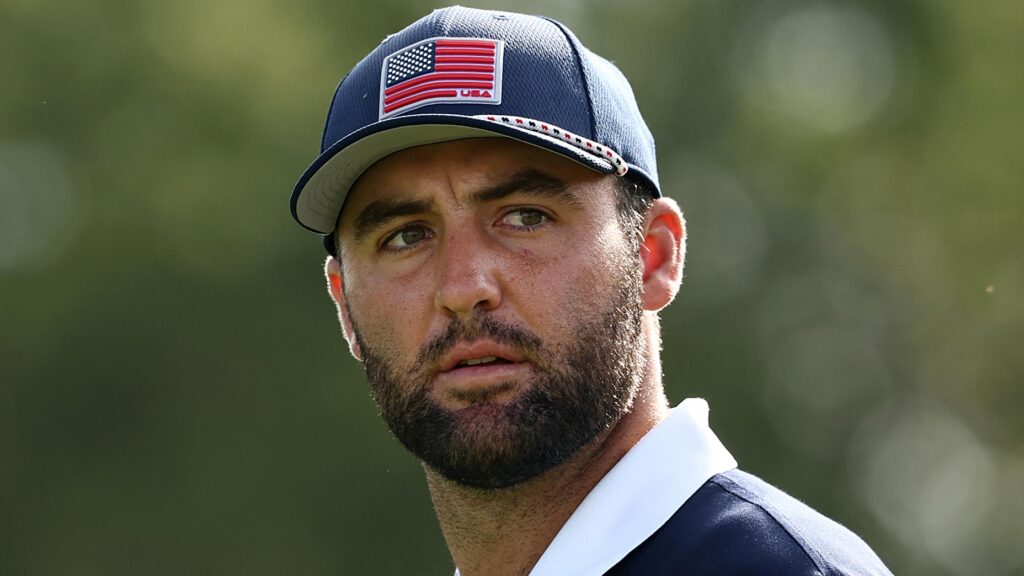Ryder Cup 2025: Analyzing Scottie Scheffler’s Struggles at Bethpage Black
FARMINGDALE, N.Y. — The atmosphere at Bethpage Black was electric, but for Scottie Scheffler, the electric feeling seemed miles away. Amid the raucous cheers and anxious murmurs of golf fans, Scheffler faced a pivotal moment during the 2025 Ryder Cup that could alter the trajectory of the entire match. As discussions arise regarding star players and their performances, Scheffler’s early struggles have taken center stage, offering insights into the intricacies of tournament golf under immense pressure.
The Ryder Cup, revered as one of golf’s most cherished competitions, pits the best players in the U.S. against those from Europe. Early in the Saturday session, the Americans found themselves facing significant challenges. With Cameron Young and Bryson DeChambeau starting strong, it all came down to the final match where Scheffler partnered with Russell Henley against the formidable duo Bob MacIntyre and Viktor Hovland. As tensions mounted in the 18th hole amphitheater, Scheffler’s miss sent collective shockwaves through the audience.
Much analysis of the competition’s outcome will focus on various external factors — from course setup to crowd dynamics. Yet, the most straightforward explanation for Team USA’s underperformance is simple: star players must shine, and so far, Scheffler’s results have been disappointing.
To understand Scheffler’s underwhelming performance, one must look at the numbers. He has been statistically solid, placed second among U.S. players according to data from sources like DataGolf. However, statistics don’t capture the essence of competitive golf, and the absence of birdies over an extended stretch illustrates the struggle Scheffler faced against the formidable European players.
This narrative isn’t new in the annals of golf history. Scottie Scheffler’s difficulties can be compared to those experienced by legends like Tiger Woods. Despite a legendary career, Woods faced challenges in the Ryder Cup, evidenced by a lackluster record that belies his overall success in individual tournaments. Scheffler’s struggles could signal a similar pattern where the pressures of team play disrupt individual brilliance.
As the competition continues, the European team has demonstrated a fierce determination to win, with stars like Rory McIlroy and Jon Rahm capitalizing on the American team’s vulnerabilities. The synergy displayed by these players, boasting an impressive collective record, only amplifies the scrutiny on Scheffler and the U.S. squad.
In examining Scheffler’s unique skill set, one begins to wonder: Is it the format that undermines his strengths? The alternate shot format, often pivotal in the Ryder Cup, may not align with Scheffler’s high-caliber game. Golf is as much a mental challenge as it is a physical one, and perhaps the chaos of the Ryder Cup has created hurdles that even the best find hard to navigate.
Looking ahead, Scheffler’s experience in this tournament will shape future strategies for Team USA. The next Ryder Cup captain must deeply analyze the underlying reasons for his poor performance. Will a new approach help elevate the team, or is there something fundamentally different in how the competition is played internationally?
As the final day of the Ryder Cup approaches, the narrative surrounding Scottie Scheffler reflects a larger story of resilience. The importance of star players in the Ryder Cup cannot be overstated. Should the U.S. team wish to reclaim glory on international golf’s biggest stage, finding ways to integrate their brightest talents effectively will be paramount.
By understanding the complexities surrounding Scheffler’s play and the overall dynamics of the Ryder Cup, fans and analysts can better appreciate the challenges faced by competitors. Nonetheless, as we witness both the resurgence of European players and the trials of American stars, one thing remains clear: the Ryder Cup continues to captivate and challenge even the very best in the game.
In conclusion, the future of Team USA hinges on learning from current experiences. Whether Scheffler executes a radical turnaround in the singles matches or carries these lessons into future competitions, the pressure remains high. As spectators, we can only rally behind our players and anticipate a thrilling finish as the Ryder Cup 2025 draws to a close.


